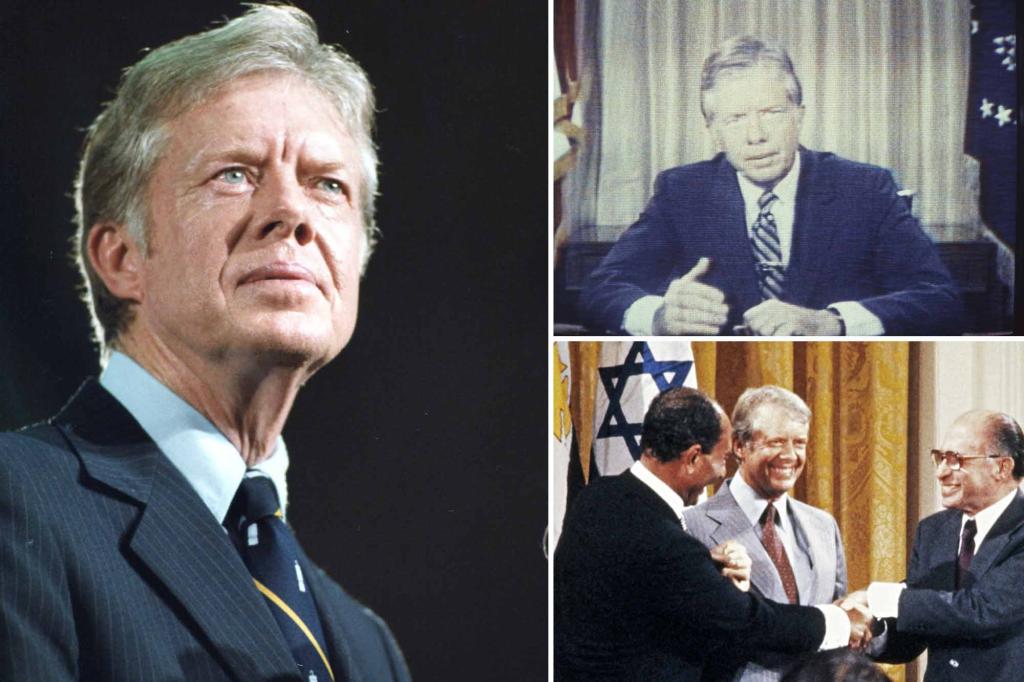Paragraph 1: The Carter Presidency – A Tumultuous Era
Jimmy Carter’s presidency, spanning from 1976 to 1980, was a period marked by significant domestic and international challenges. Ascending to the office after defeating Gerald Ford, the former peanut farmer from Georgia faced a nation grappling with the lingering effects of the Vietnam War, an energy crisis fueled by OPEC, and a Cold War that continued to cast a long shadow over global affairs. These complex issues intertwined to create a sense of national unease and uncertainty, often referred to as “stagflation,” characterized by high inflation, high unemployment, and slow economic growth. This backdrop set the stage for a presidency defined by both significant accomplishments in foreign policy and persistent struggles on the domestic front.
Paragraph 2: Foreign Policy Triumphs and Tribulations
Despite the domestic difficulties, Carter achieved notable successes in foreign policy, particularly in the Middle East. His tireless efforts to broker peace between Egypt and Israel culminated in the historic Camp David Accords in 1978. This landmark agreement, the first of its kind between an Arab nation and Israel, solidified Carter’s reputation as a peacemaker. He also finalized the treaty returning the Panama Canal to Panama, a move that addressed a long-standing point of contention between the two countries. However, the Soviet invasion of Afghanistan in 1979 presented a new set of challenges. Carter responded with strong condemnation, sanctions against the Soviet Union, and a boycott of the 1980 Moscow Olympics. While he also signed the SALT II treaty with the Soviet Union, aiming to limit the nuclear arms race, the invasion of Afghanistan significantly strained US-Soviet relations.
Paragraph 3: The Iran Hostage Crisis and its Impact
The defining crisis of Carter’s presidency, the one that arguably overshadowed his other achievements, was the Iran hostage crisis. In November 1979, Iranian militants seized the US embassy in Tehran, taking 52 Americans hostage. The crisis, which lasted 444 days, became a symbol of American vulnerability and a source of immense frustration for the Carter administration. A failed rescue attempt in April 1980 further damaged Carter’s standing, leading to the tragic deaths of eight American servicemen. The hostages were finally released just minutes after Ronald Reagan took the oath of office, a bitter end to Carter’s presidency and a poignant reminder of the crisis that had gripped the nation.
Paragraph 4: Domestic Challenges and the "Malaise" Speech
Beyond the hostage crisis, Carter faced a myriad of domestic problems, including the Mariel boatlift, where thousands of Cubans, including criminals and psychiatric patients released by Fidel Castro, fled to the United States, straining resources and creating social tensions. The ongoing energy crisis, exacerbated by the Iranian revolution, further compounded the economic woes of the nation. In his famous "malaise" speech, although he never used the word “malaise,” Carter addressed the nation’s "crisis of confidence," acknowledging the deep-seated anxieties and frustrations of the American people. While intended to rally the nation, the speech was perceived by some as pessimistic and further contributed to the perception of a faltering presidency.
Paragraph 5: Post-Presidency Humanitarian Work and Legacy
After his defeat by Ronald Reagan in the 1980 election, Carter embarked on a remarkable post-presidency dedicated to humanitarian work and conflict resolution. Through the Carter Center, he tirelessly championed human rights, democracy, and economic development around the world. His efforts to eradicate diseases, mediate conflicts, and promote fair elections earned him international acclaim, culminating in the Nobel Peace Prize in 2002. This dedication to service redefined his legacy, transforming him from a one-term president grappling with crises to a global advocate for peace and human rights. He dedicated decades to building homes for the poor with Habitat for Humanity, solidifying his commitment to service.
Paragraph 6: Personal Reflections and Anecdotes
While Carter’s presidency is often remembered for the serious challenges he faced, his personal life and occasional candidness also contributed to his public image. His devout Baptist faith and commitment to family values were central to his identity. However, a pre-election interview with Playboy magazine, in which he confessed to having "committed adultery in my heart," generated controversy. A less serious, but equally memorable incident involved Carter’s encounter with a swamp rabbit while fishing, which was later exaggerated into a humorous anecdote about being attacked by a "killer rabbit." These anecdotes, while seemingly trivial, highlight the human side of a president who navigated a complex and turbulent period in American history. His long life, reaching over 100 years, allowed him to witness the long-term impact of his work and solidify his place as a unique figure in American political history.









